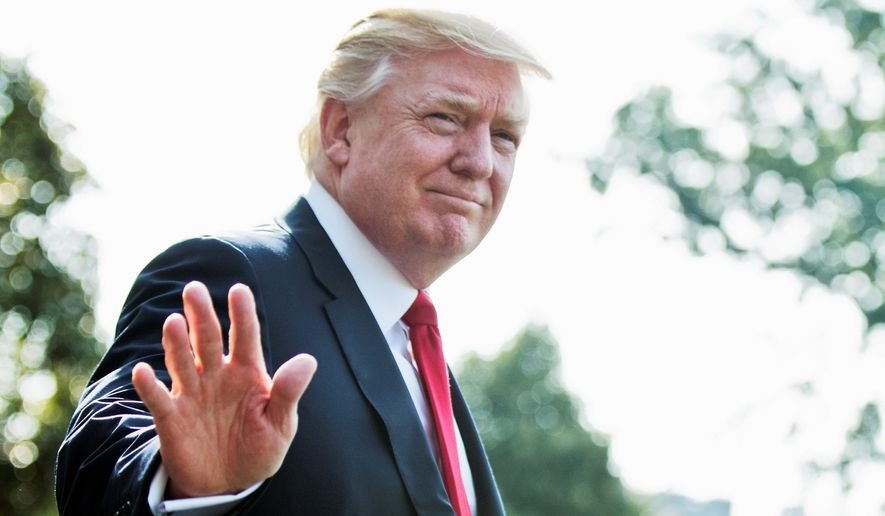Congress will vote this week on codifying Obama-era sanctions against Russia, pursuing a bipartisan deal that will mark lawmakers’ first major show of independence from President Trump.
In a deal announced Saturday, both Republican and Democratic leaders said they had worked through hurdles and came up with a final bill that includes penalties for Russia, Iran and North Korea. The three hot spots have bedeviled American policymakers for years.
But it’s the Russia sanctions that are likely to test Mr. Trump, who has sought flexibility to work with Moscow while lawmakers push for a harder line.
The White House on Sunday gave mixed signals about how the president is approaching the sanctions bill. The newly minted communications director suggested that the president could veto the legislation, and the new press secretary said he supports the bill as it stands.
A first vote is scheduled for Tuesday in the House, where leaders from both parties have sparred over how much power to give Democrats in demanding a review if Mr. Trump waives the sanctions on Russia.
The fight and the broader legislation have taken on bigger significance as questions about the president’s family and aides and their dealings with Russia proliferate.
PHOTOS: Congress tests Donald Trump with Russia sanctions bill
“Given the many transgressions of Russia, and President Trump’s seeming inability to deal with them, a strong sanctions bill such as the one Democrats and Republicans have just agreed to is essential,” said Senate Minority Leader Charles E. Schumer, New York Democrat.
A bill imposing penalties on North Korea emerged from the House earlier this year, and bills targeting Iran and Russia have cleared the Senate.
The Russian sanctions have garnered the most attention because of last year’s election meddling by Moscow and because of Mr. Trump’s conflicting signals about his view of the Russian regime.
President Obama, in his final months in office, imposed restrictions on a number of Russian entities and individuals the U.S. has blamed for cyberattacks. The sanctions allow the U.S. to block property and other dealings.
The latest bill would list in law entities and even personal targets, such as the head of Russia’s military intelligence. It also would expand sanctions to the energy, railway and mining sectors of Russia’s economy.
Lawmakers list a long set of grievances that have prompted the moves, including Russian adventurism in Ukraine, cyberattacks and efforts to threaten Europe’s energy supplies.
Mr. Obama used executive authority to issue sanctions, and Capitol Hill has feared Mr. Trump could use the same powers to lift the penalties without winning any concessions in return.
New White House communications director Anthony Scaramucci, during an interview on CNN’s “State of the Union,” would not say Sunday whether Mr. Trump will veto the bill.
“The president will make that decision when he makes the decision,” Mr. Scaramucci said.
But new press secretary Sarah Huckabee Sanders suggested on ABC’s “This Week” that the president would sign it.
“The administration is supportive of being tough on Russia, particularly in putting these sanctions in place,” she said. “We support where the legislation is now.”
All sides on Capitol Hill said they expect massive bipartisan support for the legislation, giving Congress a solid victory in a year otherwise devoid of major accomplishments. This one, however, strikes at Mr. Trump, which helps explain why Democrats are eager to sign on.
Combining the Russian sanctions with penalties against Iran and North Korea could sweeten the deal for lawmakers who don’t want to be seen delivering a spanking to Mr. Trump.
The bill marks the latest instance of Congress asserting itself on foreign policy — though lawmakers have taken pains to respect the president’s authority.
In order to block Mr. Trump from lifting sanctions, Congress would have to pass a resolution of disapproval, which the president would likely veto, requiring a two-thirds vote to override and impose lawmakers’ will.
It’s the same method adopted for the Iran nuclear deal. In that instance, most Democrats backed the president, helping preserve his free hand in carrying out that controversial agreement.
For the Russia sanctions, the final sticking point was over whether Democrats would have power to force a vote in the House. In the end, the legislation does allow for the top House Democrat to call for a vote on a resolution of disapproval in the event that the president tries to waive sanctions.
• Stephen Dinan can be reached at sdinan@washingtontimes.com.
• Alex Swoyer can be reached at aswoyer@washingtontimes.com.




Please read our comment policy before commenting.